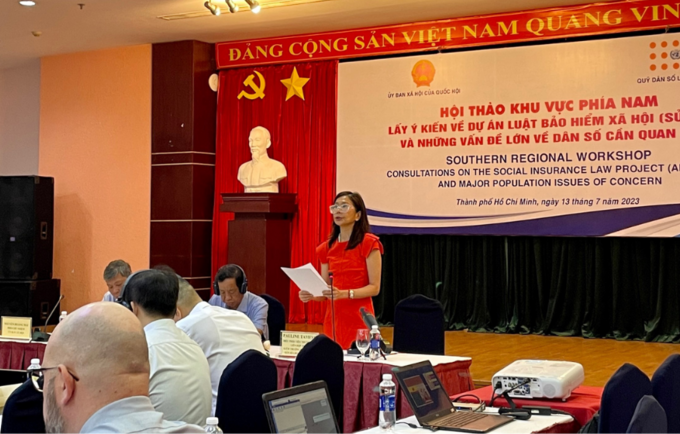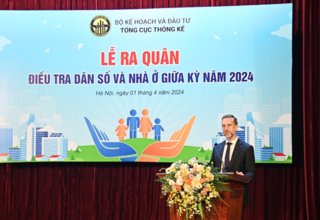Opening Remarks by Ms. Pauline Tamesis, UN Resident Coordinator & UNFPA Officer-in-Charge/Representative
- Excellency Mr. Dang Thuan Phong, Vice Chairperson of the Parliamentary Committee for Social Affairs
- Excellency Mr. Nguyen Hoang Mai, Vice Chairperson of the Parliamentary Committee for Social Affairs
- Distinguished Delegates of the National Assembly, Government, People’s Councils, Labour Confederation
- Excellencies, Colleagues
Good morning. It is a privilege to join you for the consultations on the social insurance law revision and major population issues of concern. At the outset, let me express my sincere gratitude and congratulate the Parliamentary Committee for Social Affairs (PCSA) for organizing this important workshop.
On behalf of the UN Country Team in Viet Nam, I am pleased to convey our appreciation to the National Assembly and Government of Viet Nam for the unwavering focus on people-centered, inclusive and sustainable development. This is clearly demonstrated by Viet Nam’s strong commitment to the 2030 Agenda for Sustainable Development that has been translated into a National Action Plan for the implementation of the Sustainable Development Goals (SDGs) and mainstreamed into national and sectoral development plans and strategies.
Our discussion today on the Social Insurance Law revision is very timely, given that Viet Nam is presenting its 2nd Voluntary National Review (VNR) at the High-Level Political Forum (HLPF) in New York tomorrow, 14 July. Viet Nam’s VNR identifies social protection as one of the key priorities for SDG acceleration.
Excellencies, distinguished participants,
Over the past few decades, Viet Nam has made significant strides in socio-economic development. The Human Development Index (HDI) increased from 0.689 in 2016 to 0.703 in 2021, which categorizes Viet Nam as a High Human Development country since 2019. In 2022, Multi-dimensional poverty decreased to 3.6% from 9% in 2016.
In terms of social protection, including social insurance, which is a crucial social safety net for protecting the people’s lives and livelihoods – especially the most vulnerable groups, Viet Nam has also achieved notable progress. The social insurance system today includes both compulsory and voluntary components and protects workers against a wide array of life contingencies, such as sickness, employment injury, old age and death.
2023 data shows that around 17.5 million workers were registered in social insurance, remarkable progress when we recall that just seven years ago, in 2016, less than 13 million workers were registered. This represents an increase of more than half a million workers per year. Despite the progress, there remain major challenges than can be overcome with strong solidarity.
The social insurance coverage today still represents only 37% of the labour force, which is still significantly below the target defined by the Party Resolution 28 (adopted in 2018) of reaching 60% coverage by 2030. When looking at the growing elderly population in Viet Nam, we also observe that coverage rate is still significantly below the target of 60% by 2030. In this regard, a large proportion of the population have yet to be protected through the social insurance system.
Additionally, maternity protection is a key labour right of working women. It is important for enhancing the wellbeing, health, and nutrition of mothers and children, and for ensuring women’s equal opportunity and treatment in the world of work. In Viet Nam, just 30% of women in the labour force were covered for maternity. Not all women are in the labour force, so the effective level of protection is even lower. Lack of maternity protection affects not only women’s earnings and work trajectories but also the well-being of mothers and children and of the family at large.
Maternity leave and benefits in Viet Nam differ significantly for different groups of women, depending on their labour market status. Women who are covered by the statutory social insurance scheme enjoy quite generous maternity protection. However, 81% of women in informal employment in the country have no maternity protection (except for maternity health care, which is provided through the Social Health Insurance Scheme). Likewise, the paternity benefit of 5-day paid leave in the regular birth condition is a good signal to recognise the role of the father as a caregiver to the new baby, yet it is too short to sufficiently share the childcare responsibility with women. In addition, the benefit is only available to a limited proportion of men who are members of compulsory social insurance scheme, leaving the majority of working men without paternity protection.
As Viet Nam’s population is rapidly ageing, developing a robust social insurance system is even more necessary to protect the people, especially the elderly. In addition, the 2016 Viet Nam National Disability Survey showed that 10.1% of the older people (1.2 million) need care, and the proportion of the older people who need care is notably higher for those with disabilities.
Given changing demographic and family structures, especially in light of fertility decline, urbanisation and smaller nuclear families, the traditional family support networks may become limited and less effective in the coming decades. Social insurance will not replace families in their caregiver roles, rather ensure that they are adequately supported to provide care for their loved ones.
Overall, social protection plays an important role and one that must be reinforced and strengthened for Viet Nam to achieve the SDGs in 2030 and become a High-Income Country in 2045. This will also set firm foundation for Viet Nam to cope with mounting challenges, resulting from demographic changes, technological development, climate change, and rising economic volatility.
Excellencies, distinguished participants,
It is encouraging that Viet Nam continues to strengthen and expand social protection policies, particularly social insurance system in which the legal amendment we gather here to discuss today. As the UN in Viet Nam, we believe that there are a number of policy options and investments that can be made to strengthen and improve social insurance system in the country to protect the people, especially the vulnerable groups.
First, a whole-of-society and a whole-of-government approach are vitally important for the development of social protection including social insurance. This is because a well-integrated social insurance and social assistance system would help strengthen societal solidarity and deepen sense of mutual support and social cohesion among the citizens. This stimulates a larger positive impact on economic development and improves resilience of the system.
Second, expanding the coverage of the social insurance system must be at the core of the current Social Insurance Law revision. We are very happy to observe that the law revision will indeed include several important changes that can have very strong and positive impact on coverage in the years to come. This must include efforts to ensure the system is shock-responsive and inclusive, especially of the more vulnerable groups.
Third, exploring the expansion of maternity and paternity protection going forward will be important, both from a social insurance and a social assistance perspective, as such benefits tend to have beneficial impacts not only on children’s development and gender equality but also on economic prosperity.
Fourth, it is important that attention continues to be paid to the adequacy of the benefits paid by the social insurance system, to ensure that the protection that the beneficiaries receive is substantive enough to enable them to mitigate the risks faced throughout their life cycles.
Finally, financial sustainability of the system is key as higher investments provide better protection. We understand the limitations in terms of fiscal space, which every country faces in its public spending choices. Viet Nam is in a viable position to consider increasing its investment in social protection, and social insurance in particular, as its levels of investment continue to be significantly below both the regional and the world averages.
At this point, please allow me to cite an empirical evidence based on the UN study that an investment of 1 million Dong in social policies (i.e., social protection, education and healthcare) leads to an expansion of GDP by 3.2 million Dong. This significant and positive effect of social investment would result in not only greater social returns but more inclusive and sustainable growth; contributing to achieving the goal of leaving no one behind. The experience of the COVID-19 response shows that social protection policy measures were beneficial for not only averting an economic recession in Viet Nam but also supporting the people’s livelihoods and preventing a spiral into poverty.
Only through sustained commitment to strengthening and expanding social protection – and in parallel, investments – can we truly aim at accelerating the progress towards meeting Viet Nam’s national development priorities, and the long term goal of providing social protection for all, as embodied in the SDGs.
Excellencies, distinguished participants,
In closing, on behalf of the UN, I reiterate the call for solidarity, for continued joint efforts and increased investments in strengthening the social insurance system, particularly through the ongoing revision of the social insurance law. These efforts benefit all the people of Viet Nam, and moves closer to realizing the vision put forth by Party Resolution 28 and the 2030 Agenda.
I am confident that the partnership between Viet Nam and the UN, including UNFPA, will continue to thrive. I reaffirm our continued commitment for inclusive and sustainable development of Viet Nam.
I wish you all good health, happiness and success.
Thank you! Xin cam on!




